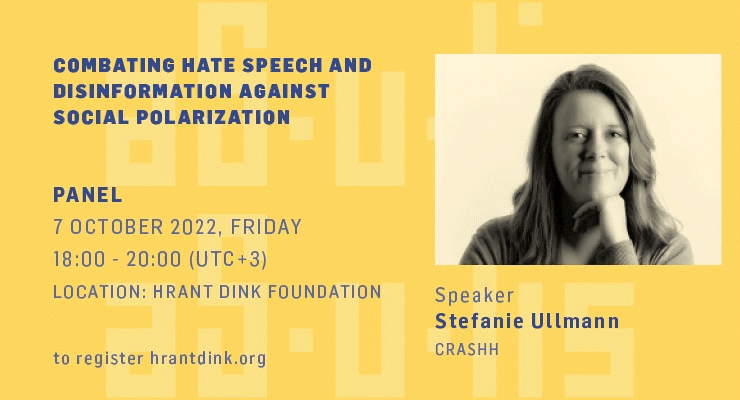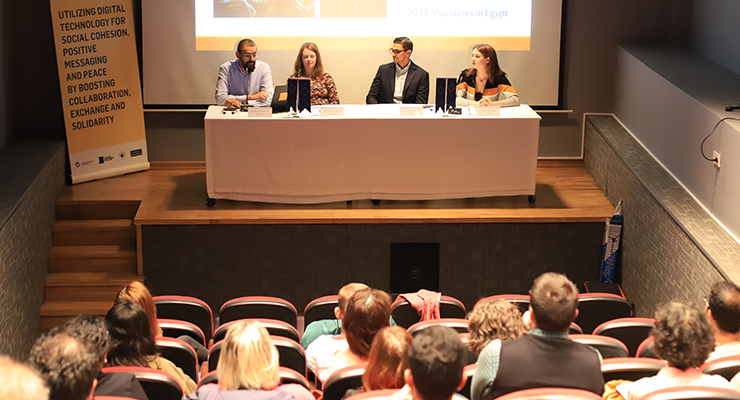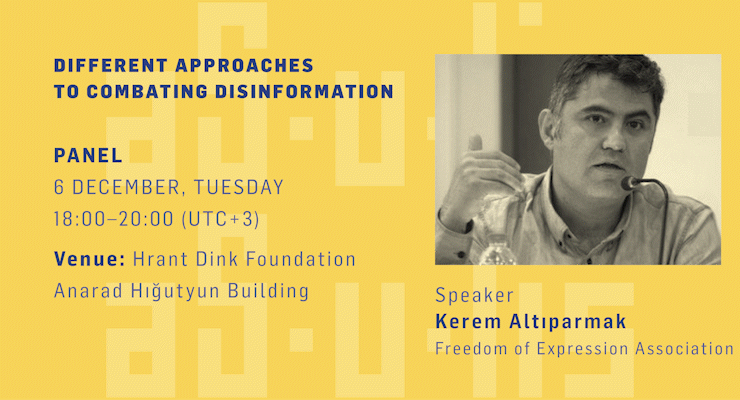The third of the panel series titled "Relation of Conspiracy Theories and Disinformation" organized within the scope of the project “Utilizing Digital Technology for Social Cohesion, Positive Messaging and Peace by Boosting Collaboration, Exchange and Solidarity” was held on Wednesday, May 3 2023 at the Hrant Dink Foundation’s Havak Hall. The panel was broadcast live on the foundation's YouTube account in English and Turkish. The panel was moderated by Gülin Çavuş from Teyit, and the panelists were Dan Evon from News Literacy Project, Mariam Gersamia from Ivane Javakhishvili Tbilisi State University and Erkan Saka from Istanbul Bilgi University.
In her opening address, Beate Apelt, the Turkey Office Director of Friedrich Naumann Foundation, mentioned tips for harmonious living as a society in an information environment/knowledge climate/information frame in which hate speech, disinformation and conspiracy theories are promoted and strengthened. Apelt also mentioned that hate speech, disinformation and conspiracy theories not only provoke hatred, but manipulation result in a lack of freedom in society.
The moderator of the panel Gülin Çavuş started the panel by introducing the speakers, then shared a conspiracy theory example which approximately 34% of the society in Turkey believes to be true. She continued directing questions to Dan Evon, asking how we should comprehend conspiracy theories and how false information affects our beliefs in conspiracy theories.
Evon explained how false beliefs lead people to conspiracy theories. He mentioned five factors; truth, source, proof, content, and reason to be protected from false claims. Emphasizing that conspiracy theories have existed for centuries, he highlighted the impact of social media platforms on the spread of conspiracy theories. He set out the basic features of conspiracy theories and explained our motivation to believe these under the headings intriguing stories, simplified explanations, motivated reasoning and a feeling of belonging. Instead of trying to figure out the unknown, it is easier to believe something that includes mysterious storylines, he added. Since conspiracy theories provide simpler and easier answers to complex questions, it is not possible to check whether the information it carries is true or not. He also mentioned that people can produce alternative explanations in a groundless way, instead of accepting a dramatic incident as it is. Stating that conspiracy theories are considered as a compelling belief system, he mentioned that fake news encountered in social media provides the sources that feed these false beliefs. He mentioned that false information provides some fake proofs that support conspiracy theories and acts as a buffer to fill-in the information blanks. Mentioning the cyclical relation between false news and conspiracy theories, he concluded his presentation by adding that this cycle can be broken with systematic, individual and educational interference.
Mariam Gersamia handled the conspiracy theory and disinformation relation from the media psychology approach, and started her presentation by indicating that the actual source of disinformation and propaganda is hate speech. Conspiracy theories having basic and populist qualities, and the people targeted by the theory are always “others”. As such, conspiracy theories polarize society as “we” and “them”. She mentioned that there are four different effects caused by conspiracy theories; communicational, psychological, social/political/economic, and mistrust towards democratic organizations. She mentioned disinformation aims to affect emotions and explained its relation with overall health. Under the influence of anger and rage, disinformation has a stronger impact and permanence on the mind. Emotions such as rage, disgust, sorrow, and fear are all related to conspiracy theories in a way that people tend to follow news that carries these features and this is a common trait with conspiracy theories. The main goal of these theories are to trigger fear. Theories benefit from the lack of information of the person to have an emotional impact, hence she highlighted the importance of obtaining information in order to fight conspiracy theories.
Erkan Saka started his presentation by indicating that conspiracy theories are a narrative and disinformation is a part of this narrative. He added that these designed narratives are permanent and affect society in a negative manner. Since theories facilitate the interpretation of life, Saka claimed that this is why people tend to believe them. Distorting information sources lead to an intellectual information crisis. Each citizen on social media can produce content, but this content does not bear beneficial information every time. As a result of this, every citizen becomes a potential creator and distributor of disinformation and conspiracy theories. He also emphasized the importance of quality journalism in the fight against disinformation and conspiracy theories. Living in a wider irregularity of information, every formed narrative should have its counter narrative . He also emphasized the importance of having variety in every kind of media, and mentioned the impact of this variety on the trustworthiness of information. He also added that there is a disinformation industry being developed and there are people benefitting from that. Erkan Saka highlighted the importance of critical thinking and critical perspectives and emphasized the necessity of an intellectual battle in order to defeat disinformation and conspiracy theories.

This project is financed by the European Union.




